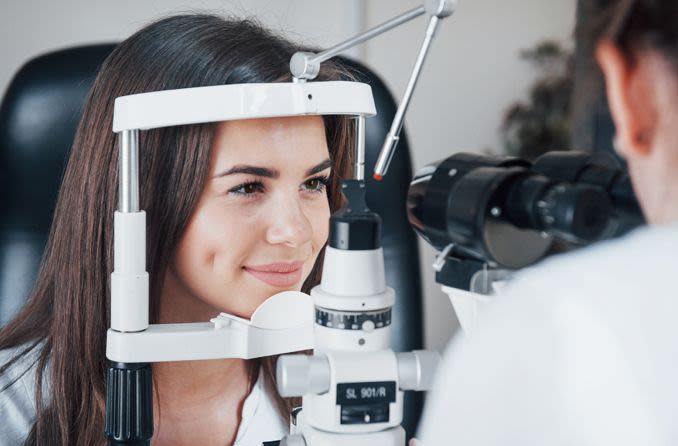眼科检查成本and when to have an eye exam

Common questions about eye exams include:
How much does an eye exam cost?
How frequently should I have my eyes examined?
What should I bring with me to my exam?
These guidelines can help you prepare for aneye exam. The first step ischoosing the best eye doctorfor your needs.
眼科检查成本
Eye exams are available through several different venues, including an independent eye doctor's office, the eye department of a multidisciplinary medical clinic, a group eye care practice (optometrists, ophthalmologists or both), and at an optical retailer or optical shop that also offers eye exams by an affiliated optometrist.
The cost of an eye exam can vary significantly, based on where you live and other factors, including:
Whether the exam is performed by an optometrist (OD) or an ophthalmologist (MD)
The tests that are included in the exam
Whether the exam includes a contact lens fitting or other contact lens-related services
The cost of an eye exam can range widely depending on these factors, and whether some or all of the exam is covered by your medical or vision insurance.
Eye exams for爱游戏体育nearly always cost more than routine exams to check your general eye health and update youreyeglassesprescription.
When comparing how much an eye exam costs, be sure you are comparing "apples to apples." Acomprehensive eye examshould include at least the following:
A review of your personal and family health history and any history of eye problems.
Evaluation of your distance and near vision with aneye chart
Evaluation for the presence of爱游戏ayx官网 ,farsightedness,astigmatism
Near vision testing to determine if you havepresbyopiaand needprogressive lenses
Evaluation of your eyes' ability to work together as a team
An eye pressure test and examination of the optic nerve to rule outglaucoma
Examination of the interior of your eyes to rule out other eye problems, such ascataractsandmacular degeneration
Contact lens examstypically include additional tests and procedures beyond those noted above.
Be sure to ask what tests are included when you obtain information about eye exam costs. Some locations will advertise a low exam fee, but upon arrival you may be informed you must pay extra if you want certain procedures — such as pupil dilation, retinal photos, etc. — that may be included in a higher exam fee quoted elsewhere.
Certain "intangibles" also should be considered when you compare eye exam costs. These might include: the professionalism and friendliness of the doctor and staff; the level of training of the doctor's assistants; how long you must wait to be seen; how advanced (or outdated) the exam equipment is; the convenience of the office location; and hours of operation.
It's also a good idea when choosing an eye doctor to ask friends for referrals and to "shop around" first via a personal visit to the office before scheduling an exam.
When to have your eyes examined
Most eye care professionals recommend that you have a comprehensive eye exam every one to two years, depending on your age, risk factors and whether you currently wear eyeglasses or contact lenses.

Children need regular eye exams to detect vision problems that may interfere with learning.
Children
Routine eye exams are essential for children to be ready to learn in school, and experts say more than 80 percent of information children receive in classrooms is presented visually.
Children generally should have their first eye exam at 6 months of age, another exam at age three and again at the start of school. Risk-free children should then continue to have their eyes examined every two years until age 18.
Children with risk factors for vision problems may need their first eye exam earlier than 6 months of age and may need more frequent eye exams throughout childhood.
Examples of risk factors include:
History of premature birth or low birth weight
Infection of mother during pregnancy (examples: rubella, venereal disease, herpes, AIDS)
Developmental delays
Turned or crossed eyes (strabismus)
Family history of eye disease
Physical illness or diseases
Also, children who currently wear eyeglasses or contact lenses should have annual eye exams.
Adults
保持一生的健康的愿景,成年人ges 18 to 60 should have a comprehensive eye exam at least every two years. Older adults (age 61 and older) should have annual exams.
"At risk" adults should have more frequent exams. Risk factors for adults include:
A family history of eye disease (glaucoma, macular degeneration, etc.)
Diabetes or high blood pressure
A visually demanding occupation or one that may pose hazards to the eyes
Taking prescription or non-prescription drugs that may have visual or eye-related side effects
Previous eye injuries or eye surgery (includingcataract surgery)
If you have any doubts about how often you (or your children or parents) should have your eyes examined, ask your eye doctor.
| Patient Age or Situation | Examination Interval if Asymptomatic or Risk-Free | Examination Interval if at Risk |
|---|---|---|
| Birth to 24 months | At 6 months of age | By 6 months of age or as recommended |
| 2 to 5 years | At 3 years of age | At 3 years of age or as recommended |
| 6 to 18 years | Before first grade and every two years thereafter | Annually or as recommended |
| Children who wear eyeglasses or contact lenses | Annually or as recommended | Annually or as recommended |
| Reprinted with permission from the American Optometric Association | ||
| Patient Age or Situation | Examination Interval if Asymptomatic or Risk-Free | Examination Interval if at Risk |
|---|---|---|
| 18 to 60 years | Every two years | Every one to two years or as recommended |
| 61 and older | Annually | Annually or as recommended |
| Adults who wear eyeglasses or contact lenses | Annually or as recommended | Annually or as recommended |
| Reprinted with permission from the American Optometric Association | ||
Who should I see for my eye exam?
There are three different kinds of eye care professionals:ophthalmologists,optometristsandopticians. Who you should see depends on your needs.
Ophthalmologistsare medical doctors (MDs or DOs) who specialize in eye care. In addition to performing eye exams and prescribing eyeglasses and contacts, most ophthalmologists also performeye surgeryand treat medical conditions of the eye.
Ophthalmologists are eye doctors who have completed medical school and have undergone additional post-graduate training in medical and surgical eye care.
Optometrists眼科医生诊断接头吗nose vision problems and treat medical conditions of the eye witheye dropsand other medicines. Optometrists generally attend four years of optometry school after college to attain their Doctor of Optometry (OD) degree.
Optometrists perform eye exams and prescribe glasses, contacts,low vision aids,vision therapyto correct vision problems. They also can treat most爱游戏ayx下载 with medications. But, with a few exceptions, optometrists typically are not trained or licensed to perform eye surgery.
Opticiansare not eye doctors. They are eye care professionals who fit, adjust and repair glasses and teach patients how to apply, remove and care for contact lenses. Some opticians also fit contact lenses under the direction of an eye doctor.
Opticians generally receive their training either "on the job" by apprenticeship or from technical schools.
Now that you know what an eye exam costs, when to have an eye exam and how to choose an eye doctor, all that's left is to book your next eye exam.
Page updated June 2019



